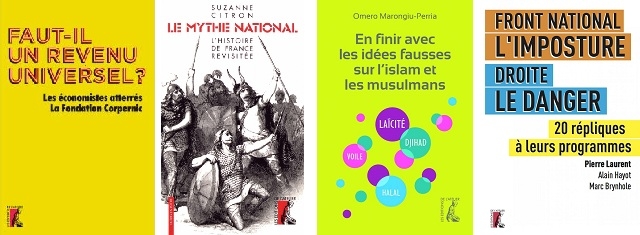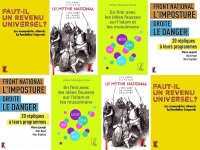Lifestyle
Universal Income,National Myth,Islam & Muslims,National Front & Righ Wing...
Four French Books in FRANCE

(Source: Editions de l'Atelier)
USPA NEWS -
The French are an ethnic group and Nation who are identified with the Country of France. This connection may be legal, historical, or cultural. France has long been a patchwork of local customs and regional differences, and while most French people speak the French language as their mother tongue..
The French are an ethnic group and Nation who are identified with the Country of France. This connection may be legal, historical, or cultural. France has long been a patchwork of local customs and regional differences, and while most French people speak the French language as their mother tongue. languages like Norman, Occitan, Catalan, Auvergnat, Corsican, Basque, French Flemish, Franconian, Alsatian and Breton remain spoken in some regions. Modern French Society can be considered a melting pot. In addition to mainland France, French people and people of French Descent can be found internationally, in Overseas Departments and Territories of France.
To be French, according to the First Article of the French Constitution, is to be a Citizen of France, regardless of one's Origin, Race, or Religion. According to its Principles, France has devoted itself to the Destiny of a Proposition Nation, a Generic Territory where people are bounded only by the French Language and the Assumed Willingness to Live Together. Seeing itself as an Inclusive Nation with Universal Values, France has always valued and strongly advocated assimilation. However, the success of such assimilation has recently been called into question....
- 'FAUT-IL UN REVENU UNIVERSEL ? ' (Do We Need an International Basic Income ?), published by Editions de l'Atelier & coordinated by Jean-Marie HARRIBEY & Christiane MARTY. The Authors are Members of Copernic Foundation & they give their analysis on this issue and taking into account the FRANCE's Economic Environment.
In a situation of continuing high levels of unemployment and poverty, heightening job insecurity, and fear about job losses due to automation, the proposal for a Universal Basic Income has become a part of the Economic and Social Debate in France and in other Developed Countries. Such a programme would pay a Monthly Allowance to any person resident in a Country with no conditions on means or activity.
In a situation of continuing high levels of unemployment and poverty, heightening job insecurity, and fear about job losses due to automation, the proposal for a Universal Basic Income has become a part of the Economic and Social Debate in France and in other Developed Countries. Such a programme would pay a Monthly Allowance to any person resident in a Country with no conditions on means or activity.
What kind of social project do Universal Income proposals form part of ? How would such a programme work in terms of increasing the levels of an allowance and how would it fit in with current social protection schemes ? Is it possible to finance a Universal Basic Income ? What would be the financial consequences for different categories of households, especially those in a financially precarious situation ? What would be the impact on activity, employment, unemployment, wages, working conditions, and in particular on menial labour, part-time work, precarious work, and low-wage jobs ? Is Universal Income a response to the 'end of work' ? Is this latter a credible hypothesis ? What are other possible ways to fight poverty and precarious work?
- 'LE MYTHE NATIIONAL - L'HISTOIRE DE FRANCE REVISITEE' (National Myth - French History revisited) by Suzanne CITRON at Les Editions de l'Atelier.
A National Myth is an Inspiring Narrative or Anecdote about a Nation's past. Such Myths often serve as an important National Symbol and affirm a set of National Values. A National Myth may sometimes take the form of a National Epic or be incorporated into a Civil Religion.
A National Myth is an Inspiring Narrative or Anecdote about a Nation's past. Such Myths often serve as an important National Symbol and affirm a set of National Values. A National Myth may sometimes take the form of a National Epic or be incorporated into a Civil Religion.
A National Myth is a Legend or Fictionalized Narrative which has been elevated to a serious Mythological, Symbolic and Esteemed Level so as to be True to the Nation. It might simply over-dramatize True Incidents, omit Important Historical Details or add details for which there is no evidence ; or it might simply be a Fictional Story that no one takes to be true literally, but contains a symbolic meaning for the nation.... From that, the Author reaffirms the need to bring back into the Debate a Critical Look to be able to understand FRANCE as a Country with Discontinuous History and Multiple Roots...
- 'EN FINIR AVEC LES IDEES FAUSSES SUR L'ISLAM ET LES MUSULMANS' (Ending with Misconceptions about Islam and Muslims) by Omero MARONGIU-PERRIA at Ediions de l'Atelier.
This Book is about Debunking Misconceptions about Islam and Muslims. Stereotypes about Muslims range from insults about terrorism to misunderstandings about the meaning of the word Allah. Islam, Muslims and The Quran have become a subject of major concern to the world media, religious groups and people, especially after the events of September 11th 2001 in the USA.
This Book is about Debunking Misconceptions about Islam and Muslims. Stereotypes about Muslims range from insults about terrorism to misunderstandings about the meaning of the word Allah. Islam, Muslims and The Quran have become a subject of major concern to the world media, religious groups and people, especially after the events of September 11th 2001 in the USA.
Many Articles and Books have been written about a Religion followed by over One Billion People Worldwide, some of which saw in Islam a Separate Civilization that will inevitably clash with the current dominant Western Civilization, but some were more optimistic, showing interest in a constructive Debate, seeking Understanding. However, many of these writings continued to perpetuate misinformation and repeat the same common misconceptions, thus giving a distorted picture of what Islam is about, and what The Quran actually says.
Misconceptions about Muslims and Islam can cover : Islam is a Religion that promotes Volence and Terrorism, slam Guides followers to oppress women, Women are forced to wear a headscarf, or hijab, by men as a sign of submission....
- FRONT NATIONAL L'IMPOSTURE - DROITE LE DANGER, 20 REPLIQUES A LEURS PROGRAMMES' (Imposture of National Front - Right Danger, 20 Answers to their programmes) by Pierre LAURENT, Alain HAYOT & Marc BRYNHOLE and published by Les Editions de l'Atelier. The Authors propose to everyone to participate to the Crucial Political Debate which cannot work without everyone's involvement.
Ruby BIRD
http://www.portfolio.uspa24.com/
Yasmina BEDDOU
http://www.yasmina-beddou.uspa24.com/
- FRONT NATIONAL L'IMPOSTURE - DROITE LE DANGER, 20 REPLIQUES A LEURS PROGRAMMES' (Imposture of National Front - Right Danger, 20 Answers to their programmes) by Pierre LAURENT, Alain HAYOT & Marc BRYNHOLE and published by Les Editions de l'Atelier. The Authors propose to everyone to participate to the Crucial Political Debate which cannot work without everyone's involvement.
Ruby BIRD
http://www.portfolio.uspa24.com/
Yasmina BEDDOU
http://www.yasmina-beddou.uspa24.com/
Ruby Bird Editions De L Atelier Omero Marongiu Perria Pierre Laurent Alain Hayot Marc Brynhole Suzanne Citron Jean Marie Harribey Christiane Marty
Liability for this article lies with the author, who also holds the copyright. Editorial content from USPA may be quoted on other websites as long as the quote comprises no more than 5% of the entire text, is marked as such and the source is named (via hyperlink).






